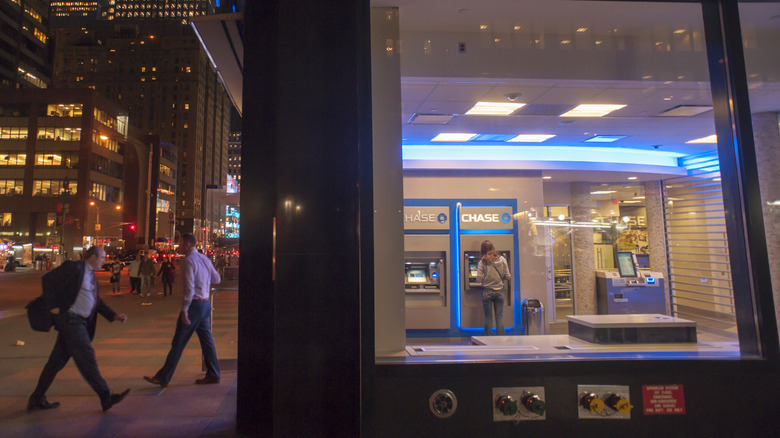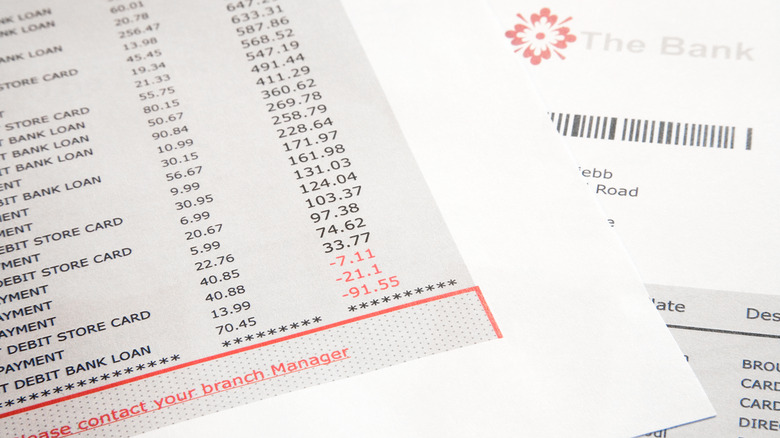Here's What Really Happens When You Bounce A Check
To some, physical checks are simply a relic of a bygone era, yet to others, they can be an important element of a person's financials. From utility payments to birthday card additions to various deposit needs, physical checks have many uses that can't necessarily be replicated in the digital world. In fact, 55% of Americans reported writing a check at some point in 2022 and 59% of millennials and Gen X reported writing a check in the last six months. While checks can be useful in managing your finances, bouncing a check can lead to costly repercussions.
A bounced check is when a bank declines to honor a written check, thereby "bouncing" it back to the account holder who wrote the check. It's important to remember that there is more than one way to bounce a check. While insufficient funds are typically the major reason a check will get bounced (called a rubber check), there are other ways to end up with a bounced check even if your account balance can cover the amount the check is for.
According to the Uniform Commercial Code (which are laws that govern commercial exchanges) a bank is not obligated to accept a check that is more than 180 days old which can lead to a bounced check. It's also important that all required elements of a check are properly included. A missing signature, amount total discrepancies, and even incorrect dates can lead to your check being bounced.
Bouncing a check
Bouncing a check can, first and foremost, lead to hefty fees. Depending on how your bank handles the charge, and the individual overdraft option you've selected for your account, you can be charged either an overdraft fee or a nonsufficient funds (NSF) fee. Overdraft fees are charged if your bank temporarily covers/pays your check amount, which thereby overdraws your account. Most banks offer you the option to select overdraft coverage. According to Bankrate, 91% of surveyed checking accounts in 2023 have overdraft fee policies. NSF fees, on the other hand, are charged if the bank decides to decline the payment altogether and essentially charge you a punitive fee for the process (this is slightly less common, with 70% of checking accounts holding this policy).
Average overdraft fees in 2023 were $26.61, which is actually a reduction compared to previous years but can still be a significant financial blow for many. The average NSF fee is slightly less at $19.94, but these specific fees can ultimately be indicative of additional fees from the payee that did not receive their promised funds. Most utilities, lenders, and other bill collectors will charge a late fee if your payment is not made on time. Plus, these penalties can be even worse if you are a new client or a repeat offender compared to established customers with excellent payment histories. It's important to realize that repeated bounced checks can lead your bank to eventually freeze or even close your account.
Long-term impact
Beyond your bank's reaction is also the fact that the intended payee of the check has now not received their promised funds. If this is a landlord you could risk damaging your relationship with them, and eventually even face potential eviction. Utilities and cell phone companies might cut off your service, and credit card companies can freeze your card or account. All of this is in addition to any late fees you might incur. Making sure to communicate with the intended recipient of a bounced check can be a crucial step in mitigating additional consequences.
It's also important to remember that a bounced check can affect your overall banking history which makes the potential to get a new bank account in the future more difficult. Not only will a bounced check affect your ChexSystems report, but late or missed payments can damage your credit report and score – which can have long-lasting effects on your ability to rent housing, receive loans, or apply for credit cards and cell phone plans. If you're unfamiliar with ChexSystems, it is actually a consumer reporting agency that keeps a record of your banking behavior as a way to assess your reliability to banks. Unlike credit bureaus which typically focus on your ability to pay bills on time, ChexSystems reports track your deposit and debit history. This means that bounced checks, unpaid fees, and especially account closures are all reflected on your account and can make you an undesirable candidate for a new account or banking institution.


